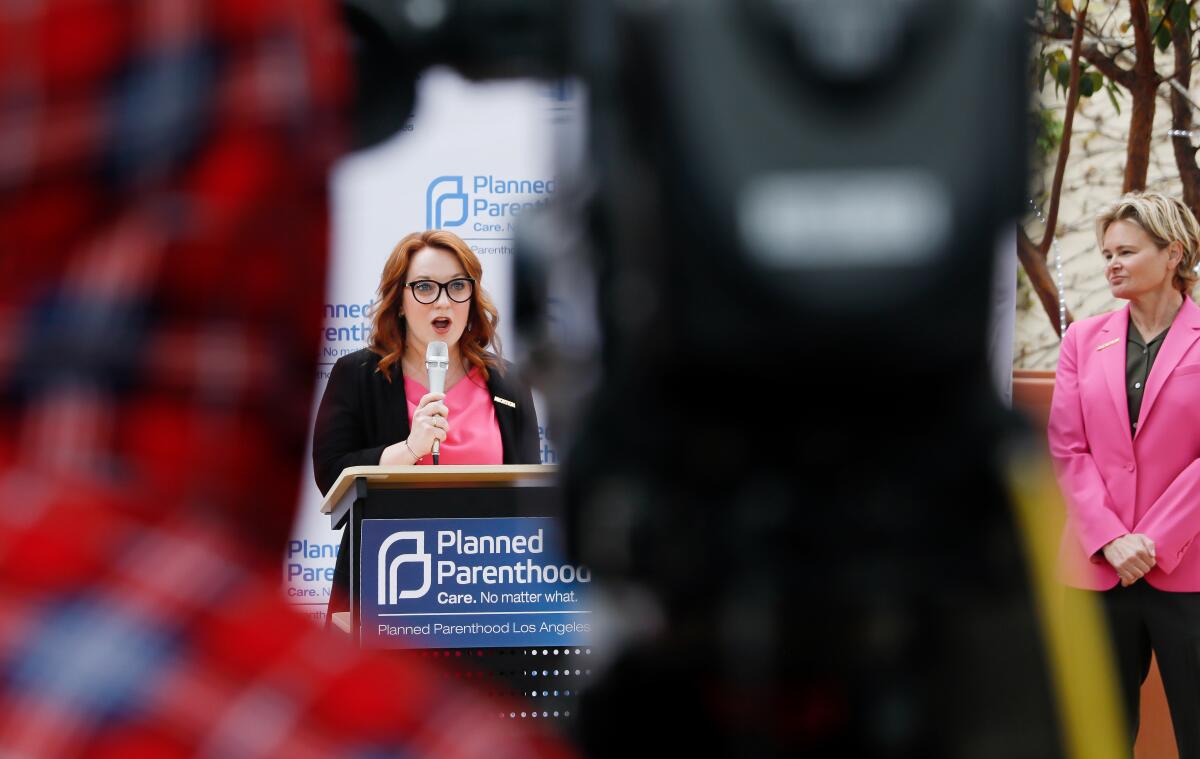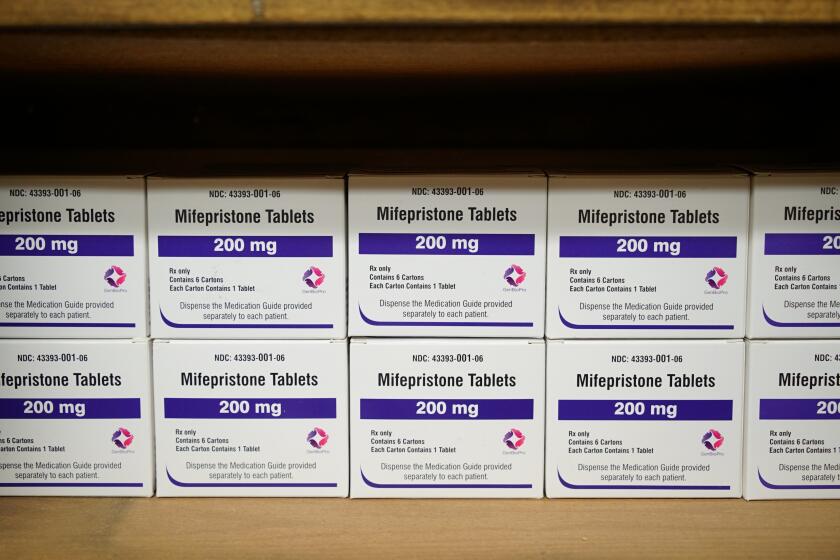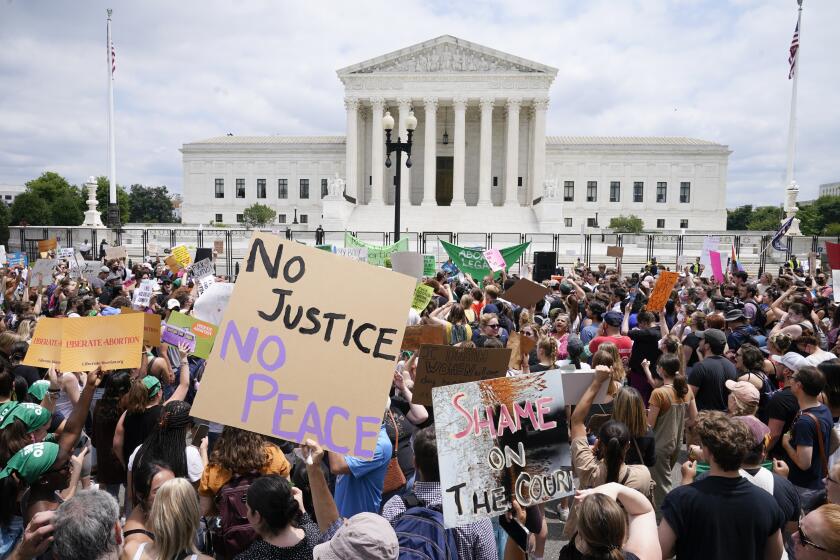California stockpiles abortion medication misoprostol after Texas court ruling

- Share via
Gov. Gavin Newsom announced Monday that California will stockpile an emergency supply of 2 million abortion pills known as misoprostol in response to a federal judge in Texas ruling against the authorization of another medication that has been used to terminate pregnancies for decades.
“In response to this extremist ban on a medication abortion drug, our state has secured a stockpile of an alternative medication abortion drug to ensure that Californians continue to have access to safe reproductive health treatments,” Newsom said in a statement. “We will not cave to extremists who are trying to outlaw these critical abortion services. Medication abortion remains legal in California.”
Abortion pill ruling: A federal judge in Texas halts FDA’s approval of mifepristone, an abortion medication. But another judge contradicts the ruling.
The announcement follows U.S. District Judge Matthew Kacsmaryk’s ruling Friday that aims to nullify the federal Food and Drug Administration’s approval of mifepristone, an abortion medication that has helped millions of women to medically end their early pregnancies. The judge gave seven days for the ruling to go into effect, and the Biden administration is appealing the decision.
Newsom said the judge’s ruling “ignores facts, science, and the law” in a way that puts “the health of millions of women and girls at risk.”
“Abortion is still legal and accessible here in California and we won’t stand by as fundamental freedoms are stripped away,” he said.
Newsom’s announcement is the latest escalation in the feud between Republican- and Democratic-led states over abortion access since the U.S. Supreme Court overturned the landmark federal abortion rights case Roe vs. Wade in June. Over the last year, some states run by Democrats have strengthened their laws to keep abortion legal, while a number of those with Republicans in power have narrowed access to the procedure or, in some cases, completely banned it.
California is one of 21 states that recently formed the so-called Reproductive Freedom Alliance to protect and expand reproductive health care. Last year, California enacted more than a dozen new laws to protect and increase access to abortion and provide more funding for services and outreach. Voters approved a ballot measure in November to codify abortion rights in the state Constitution, ensuring that California remains a haven for those seeking an abortion.
“I think for the national landscape, Newsom is clearly creating a contrast,” said Robin Swanson, a Democratic political strategist. “I don’t think it’s going to change the hearts and minds on the Supreme Court, but I do think it provides a sense of security for women seeking these healthcare services across the country, that there is a place for them to go while the national debate seems to simmer on.”
Newsom has relished his confrontational approach over the last year, including sponsoring billboards in seven states with restrictive abortion laws, telling women there that California “will defend your right to make decisions about your own health.”
The Supreme Court strikes down Roe vs. Wade, the landmark ruling on abortion that has stood for nearly 50 years.
Mifepristone is used in conjunction with misoprostol as a common abortion option for women in the United States, and research has shown the regime is safe and effective. The two-pill procedure can be substituted by a misoprostol-only option, though that can be less effective.
Although the two-pill procedure is preferred, Newsom’s office acknowledged, the state is in the process of purchasing up to 2 million misoprostol pills as the currently available backup plan to keep abortion easily accessible in California. More than 250,000 pills have arrived in the state, according to a Newsom administration statement announcing the deal.
Washington and Massachusetts have taken recent steps to build up their own supplies of mifepristone as a way to avoid the immediate ramifications of the ruling. Washington Gov. Jay Inslee said April 4 that the state had purchased a three-year supply of the drug, while Massachusetts Gov. Maura Healey said Monday that 15,000 doses are on their way.
Julia Spiegel, Newsom’s deputy legal affairs secretary, said the decision to boost California’s misoprostol stock provides “immediate assurance” to those seeking abortion care in California. And unlike mifepristone, it’s not in the crosshairs of current litigation.
“No matter what’s happening in the courts right now, you can use misoprostol,” Spiegel said.
Antiabortion advocates, who on Friday celebrated the Texas judge’s decision, denounced Newsom’s effort to keep abortion medication available in California.
“It is appalling that Gavin Newsom is so obsessed with ending the lives of children in the womb that he is attempting to stockpile dangerous and potentially illegal drugs,” California Family Council President Jonathan Keller said in a statement. “California again proves the only ‘choice’ they care about is abortion.”
Meanwhile, a federal judge in Washington issued a separate ruling Friday that ordered the FDA not to make any changes to the availability of mifepristone, setting up a legal battle expected to reach the Supreme Court.
The competing decisions underscored the impact of the legal strategy of filing a lawsuit in a particular court in hopes that a friendly judge will hear the case. While a Trump-appointed judge issued the decision in Texas, where an antiabortion group filed its lawsuit seeking to roll back the FDA’s approval of mifepristone, an Obama appointee ruled to maintain the status quo of its use in a suit brought by 18 Democratic attorneys general.
Abortion pills: European doctor vows abortion bans or court rulings won’t stop her from getting medications to U.S. states including Texas, California.
In Los Angeles, Mayor Karen Bass and County Supervisors Holly J. Mitchell and Lindsey Horvath held a news conference Monday morning with Planned Parenthood Los Angeles leaders to affirm the county’s role as a “safe haven” for abortion rights in the wake of the Texas court decision.
Both supervisors described the Texas decision as a tactic by antiabortion advocates to stoke fear and confusion around healthcare access. Mitchell called the decision “a disgrace” and said it “has no immediate impact on abortion and reproductive health services here in Los Angeles County.”
“Let it be clear,” Horvath said. “Anyone who comes to Los Angeles County will be safe. You will be protected. And this is what happens when we have a woman mayor and all women on the Board of Supervisors.”
Less clear is what may happen with mifepristone access in the county if the Texas ruling stands, effectively halting FDA approval of the medication nationwide.
“We don’t know what comes next,” Planned Parenthood Los Angeles President and CEO Sue Dunlap said, adding that they would continue to ensure that women have access to medication abortions regardless of the confusion.
“Will mifepristone still be available in L.A. County in the foreseeable future? Yes. Will all the things you’re afraid are going to happen potentially happen? Yes. Do I wish I could give you a definitive answer about what comes next? Yes,” Dunlap said.
Should FDA approval be overturned, the Los Angeles County Sheriff’s Department “will not cooperate with attempts to prosecute people who are seeking abortion care,” Sheriff Robert Luna said in a statement read by Celinda Vázquez, Planned Parenthood Los Angeles’ chief external affairs officer.
Los Angeles County law enforcement will also not prosecute decisions regarding individual reproductive care, said Joseph Iniguez, Dist. Atty. George Gascón’s chief of staff.
More to Read
Sign up for Essential California
The most important California stories and recommendations in your inbox every morning.
You may occasionally receive promotional content from the Los Angeles Times.















